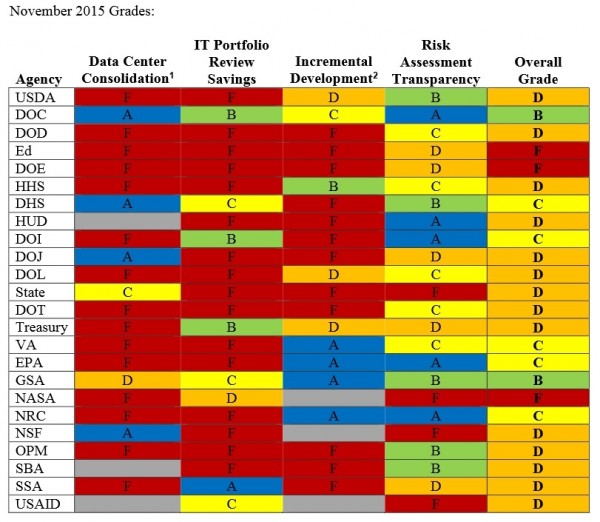
Members of the House Oversight and Government Reform Committee on Wednesday outlined numerous shortcomings in efforts by Federal agencies to implement reforms in the bipartisan Federal Information Technology Acquisition Reform Act (FITARA).
The committee issued F and D letter grades to 17 agencies because of missed opportunities to cut costs and meet other benchmarks. The committee measured the progress agencies are making on data center consolidation, IT portfolio review savings, incremental development, and risk assessment transparency.
The committee issued its report card ahead of a joint hearing before the House Oversight and Government Reform’s subcommittee on Information Technology and subcommittee on Government Operations on FITARA implementation.
“No agencies received a gold star,” said Rep. Will Hurd, R-Texas, chairman of the Information Technology subcommittee, but “some are making progress.”
The Department of Commerce and General Services Administration received the committee’s highest grades, with each earning a B for overall efforts. The departments of Education and Energy and the National Aeronautics and Space Administration (NASA) all earned an F.
Federal Chief Information Officer Tony Scott and the Federal agency chief information officers who also testified at the hearing all agreed FITARA can help agencies cut costs by consolidating procurement authority with a single person.
“FITARA provides both the necessary accountability and authority to be a successful CIO,” Department of Transportation CIO Richard McKinney told lawmakers.
FITARA will help agencies drastically reduce spending on legacy systems, modernize, and improve cybersecurity, Scott said.
“Reducing the proportion of money spent on keeping the lights on in legacy systems also strengthens our ability to leverage new technologies and approaches, further driving cost savings,” Scott said.
Lawmakers also focused on FITARA’s role in helping agencies close data centers. Hurd said data center consolidation represents a significant opportunity to save money, but that agencies are moving slowly in efforts to close or consolidate the centers.
Dave Powner, director of Information Technology Management at the Government Accountability Office, told lawmakers there are 11,700 Federal data centers, and 5,000 of those will be closed, saving $8 billion. But there is an opportunity to save even more, Powner said, and the committee’s report cards and oversight should put pressure on agencies to speed up consolidation efforts and increase savings.
Agencies need to look even more closely at their data centers to determine which ones they absolutely need and how many they can close, Powner said.
McKinney said the Transportation Department will close some of its data centers by moving data and applications to the cloud, but Hurd questioned why it’s taking the department so long to complete that transition to the cloud. In his own defense, McKinney explained that a large part of the consolidation effort is related to the Federal Aviation Administration (FAA) and the National Airspace System, which is subject to stringent security and safety concerns that can slow the transition.
The Oversight Committee indicated that it will produce another report card to grade agencies’ efforts to implement FITARA and cut IT costs.
Rich Beutel, co-author of FITARA, said the committee’s report card surprised some agencies because of the low grades, but said the committee used sound data from the Office of Management and Budget (OMB) and data from agencies themselves to arrive at the grades.
“At least one agency told me they thought they would receive A’s, so there may be some agencies that were drinking their own bathwater. But I have no reason to doubt the analytic rigor that went into the effort to develop the report card,” Beutel said.
